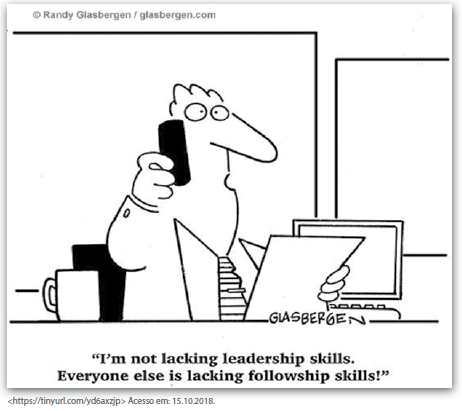Questões de Vestibular Sobre inglês
Foram encontradas 5.992 questões
eia o texto para responder à questão.
5 Ways to Boost Your Resilience at Work
Since the pace and intensity of contemporary work culture are not likely to change, it’s more important than ever to build resilience skills to effectively navigate your worklife. While working as a CEO I’ve seen over and over again that the most resilient individuals aren’t the ones that don’t fail, but rather the ones that fail, learn and thrive1 because of it.
Resilience is built by attitudes, behaviors and social supports that can be adopted and cultivated by anyone. Factors that lead to resilience include optimism and the ability to stay balanced and manage difficult emotions. To build resilience skills at work it’s important to understand and manage some of the factors that cause us to feel so stressed at work. Being hyperconnected and responsive to work anytime, anywhere, can be extremely onerous.
The current and rising levels of stress in the workplace should be cause for concern, as there is a direct and adverse relationship between negative stress, wellness and productivity. Stress that causes us to experience difficulty or unhealthy strain is a major cause for concern as it directly and adversely affects personal and business success. Here are some tips on how to develop resilience and stay motivated:
Exercise mindfulness – Turn your attention to mental training practices associated with mindfulness to improve your judgment accuracy and problem solving, job performance and cognitive flexibility.
Compartmentalize your cognitive load – Create dedicated times in the day to do specific work-related activities and not others.
Take detachment2 breaks – Step away from work for even a few minutes to reset energy and attention. Balancing work activity can promote greater energy, mental clarity, creativity and focus.
Develop mental agility – Decenter stress: step back, reflect, shift perspectives, create options and choose wisely.
Cultivate compassion – Create positive work relationships, increase cooperation and collaboration, happiness and well-being to decrease stress.
(1) Thrive: prosperar, desenvolver, ter sucesso.
(2) Detachment: descolamento, distanciamento, separação.
eia o texto para responder à questão.
5 Ways to Boost Your Resilience at Work
Since the pace and intensity of contemporary work culture are not likely to change, it’s more important than ever to build resilience skills to effectively navigate your worklife. While working as a CEO I’ve seen over and over again that the most resilient individuals aren’t the ones that don’t fail, but rather the ones that fail, learn and thrive1 because of it.
Resilience is built by attitudes, behaviors and social supports that can be adopted and cultivated by anyone. Factors that lead to resilience include optimism and the ability to stay balanced and manage difficult emotions. To build resilience skills at work it’s important to understand and manage some of the factors that cause us to feel so stressed at work. Being hyperconnected and responsive to work anytime, anywhere, can be extremely onerous.
The current and rising levels of stress in the workplace should be cause for concern, as there is a direct and adverse relationship between negative stress, wellness and productivity. Stress that causes us to experience difficulty or unhealthy strain is a major cause for concern as it directly and adversely affects personal and business success. Here are some tips on how to develop resilience and stay motivated:
Exercise mindfulness – Turn your attention to mental training practices associated with mindfulness to improve your judgment accuracy and problem solving, job performance and cognitive flexibility.
Compartmentalize your cognitive load – Create dedicated times in the day to do specific work-related activities and not others.
Take detachment2 breaks – Step away from work for even a few minutes to reset energy and attention. Balancing work activity can promote greater energy, mental clarity, creativity and focus.
Develop mental agility – Decenter stress: step back, reflect, shift perspectives, create options and choose wisely.
Cultivate compassion – Create positive work relationships, increase cooperation and collaboration, happiness and well-being to decrease stress.
(1) Thrive: prosperar, desenvolver, ter sucesso.
(2) Detachment: descolamento, distanciamento, separação.
eia o texto para responder à questão.
5 Ways to Boost Your Resilience at Work
Since the pace and intensity of contemporary work culture are not likely to change, it’s more important than ever to build resilience skills to effectively navigate your worklife. While working as a CEO I’ve seen over and over again that the most resilient individuals aren’t the ones that don’t fail, but rather the ones that fail, learn and thrive1 because of it.
Resilience is built by attitudes, behaviors and social supports that can be adopted and cultivated by anyone. Factors that lead to resilience include optimism and the ability to stay balanced and manage difficult emotions. To build resilience skills at work it’s important to understand and manage some of the factors that cause us to feel so stressed at work. Being hyperconnected and responsive to work anytime, anywhere, can be extremely onerous.
The current and rising levels of stress in the workplace should be cause for concern, as there is a direct and adverse relationship between negative stress, wellness and productivity. Stress that causes us to experience difficulty or unhealthy strain is a major cause for concern as it directly and adversely affects personal and business success. Here are some tips on how to develop resilience and stay motivated:
Exercise mindfulness – Turn your attention to mental training practices associated with mindfulness to improve your judgment accuracy and problem solving, job performance and cognitive flexibility.
Compartmentalize your cognitive load – Create dedicated times in the day to do specific work-related activities and not others.
Take detachment2 breaks – Step away from work for even a few minutes to reset energy and attention. Balancing work activity can promote greater energy, mental clarity, creativity and focus.
Develop mental agility – Decenter stress: step back, reflect, shift perspectives, create options and choose wisely.
Cultivate compassion – Create positive work relationships, increase cooperation and collaboration, happiness and well-being to decrease stress.
(1) Thrive: prosperar, desenvolver, ter sucesso.
(2) Detachment: descolamento, distanciamento, separação.
eia o texto para responder à questão.
5 Ways to Boost Your Resilience at Work
Since the pace and intensity of contemporary work culture are not likely to change, it’s more important than ever to build resilience skills to effectively navigate your worklife. While working as a CEO I’ve seen over and over again that the most resilient individuals aren’t the ones that don’t fail, but rather the ones that fail, learn and thrive1 because of it.
Resilience is built by attitudes, behaviors and social supports that can be adopted and cultivated by anyone. Factors that lead to resilience include optimism and the ability to stay balanced and manage difficult emotions. To build resilience skills at work it’s important to understand and manage some of the factors that cause us to feel so stressed at work. Being hyperconnected and responsive to work anytime, anywhere, can be extremely onerous.
The current and rising levels of stress in the workplace should be cause for concern, as there is a direct and adverse relationship between negative stress, wellness and productivity. Stress that causes us to experience difficulty or unhealthy strain is a major cause for concern as it directly and adversely affects personal and business success. Here are some tips on how to develop resilience and stay motivated:
Exercise mindfulness – Turn your attention to mental training practices associated with mindfulness to improve your judgment accuracy and problem solving, job performance and cognitive flexibility.
Compartmentalize your cognitive load – Create dedicated times in the day to do specific work-related activities and not others.
Take detachment2 breaks – Step away from work for even a few minutes to reset energy and attention. Balancing work activity can promote greater energy, mental clarity, creativity and focus.
Develop mental agility – Decenter stress: step back, reflect, shift perspectives, create options and choose wisely.
Cultivate compassion – Create positive work relationships, increase cooperation and collaboration, happiness and well-being to decrease stress.
(1) Thrive: prosperar, desenvolver, ter sucesso.
(2) Detachment: descolamento, distanciamento, separação.
eia o texto para responder à questão.
5 Ways to Boost Your Resilience at Work
Since the pace and intensity of contemporary work culture are not likely to change, it’s more important than ever to build resilience skills to effectively navigate your worklife. While working as a CEO I’ve seen over and over again that the most resilient individuals aren’t the ones that don’t fail, but rather the ones that fail, learn and thrive1 because of it.
Resilience is built by attitudes, behaviors and social supports that can be adopted and cultivated by anyone. Factors that lead to resilience include optimism and the ability to stay balanced and manage difficult emotions. To build resilience skills at work it’s important to understand and manage some of the factors that cause us to feel so stressed at work. Being hyperconnected and responsive to work anytime, anywhere, can be extremely onerous.
The current and rising levels of stress in the workplace should be cause for concern, as there is a direct and adverse relationship between negative stress, wellness and productivity. Stress that causes us to experience difficulty or unhealthy strain is a major cause for concern as it directly and adversely affects personal and business success. Here are some tips on how to develop resilience and stay motivated:
Exercise mindfulness – Turn your attention to mental training practices associated with mindfulness to improve your judgment accuracy and problem solving, job performance and cognitive flexibility.
Compartmentalize your cognitive load – Create dedicated times in the day to do specific work-related activities and not others.
Take detachment2 breaks – Step away from work for even a few minutes to reset energy and attention. Balancing work activity can promote greater energy, mental clarity, creativity and focus.
Develop mental agility – Decenter stress: step back, reflect, shift perspectives, create options and choose wisely.
Cultivate compassion – Create positive work relationships, increase cooperation and collaboration, happiness and well-being to decrease stress.
(1) Thrive: prosperar, desenvolver, ter sucesso.
(2) Detachment: descolamento, distanciamento, separação.
Considere a charge.

A charge, referente ao ambiente de trabalho, mostra um chefe sugerindo que seu funcionário

As expressões I’m not lacking leadership e Everyone else is lacking, para expressar o sarcasmo da charge, demonstram que o profissional em questão





Learning to Speak Brazinglish
By VANESSA BARBARA
Published: November 8, 2013
Brazilians are trying hard to get ready to host the 2014 FIFA World Cup.
Despite having a big territory rich with natural scenery, Brazil is not accustomed to many international visitors. The World Tourism Organization, which ranks tourist spending in different countries, puts it 39th on the list, behind much smaller countries like Lebanon, Croatia and Malaysia. Next year, the government expects tourism spending in Brazil to grow by 55 percent, thanks largely to the World Cup. But as that time draws near, the general feeling among my compatriots is one of disbelief (...). The prevailing feeling is captured by the expression “Imagina na Copa ...” — Imagine during the Cup — spoken every time we see a 112-mile-long traffic jam, an overcrowded airport or the rising prices of hotels and flights. If things are already bad, imagine what they’ll be like during the World Cup.
Such pre-tournament pessimism is common. Last year the British were skeptical about the Olympics, which turned out to be O.K. (...)
And yet Brazilians are doing what we can to welcome tourists. (...)
(http://www.nytimes.com/2013/11/09/opinion/barbara-learning-to-speak brazinglish.html pagewanted=1&_r=0 Acesso em: 13.02.2014. Adaptado)
O texto afirma que o Brasil